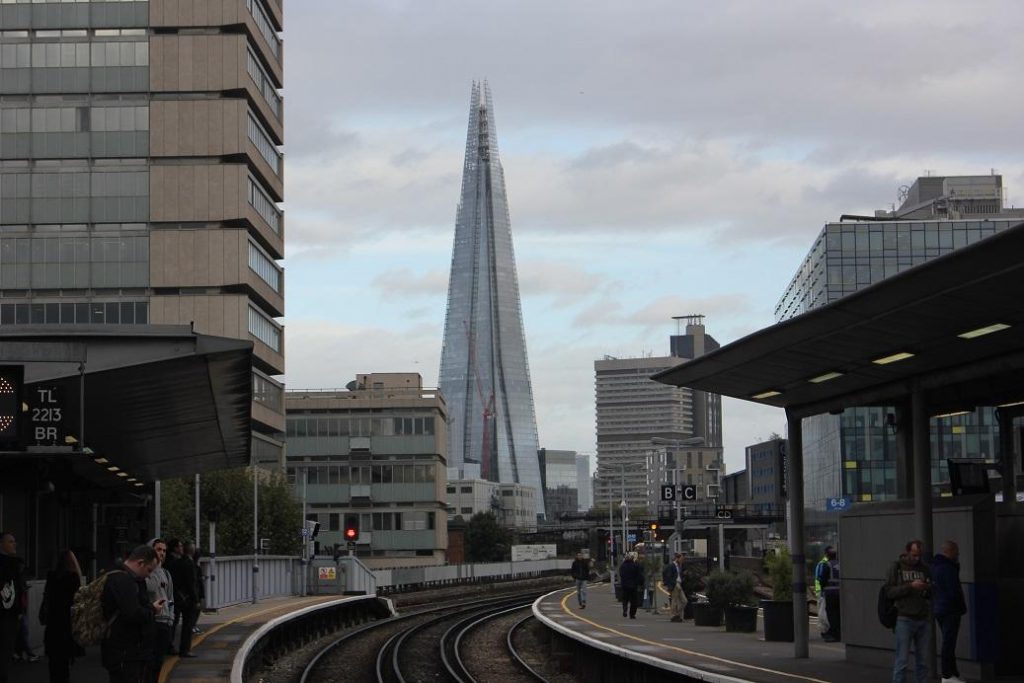
Unlike my other reports on Extinction Rebellion (XR) and related events, I can’t claim to have been around all through this epic. Our four days were only possible thanks to the generosity of South Lakes XR, whose member’s donations to a travel fund, paid our train fares. The knock-on effect of us and our two children being able to go, encouraged six other relatives to join us from other parts of the country.
A crackdown by the police after our expedition, including a supposed prohibition on all XR gatherings within the M25, I’m glad to say, was ignored. Spurring new protesters into action, the highly dubious ban, also drove many who’d come home, to return. No doubt the shadows above the police feel XR have been taking advantage, basking in the mild climate of police leniency, without realising that they are taking advantage of our non-violent stance. Whether the government, the Establishment, or the money-men like it or not, things must change. XR will not be put off by any undemocratic attempts at suppression.
During the concentrated days of especially Friday the 11th and Saturday the 12th of October, I must have talked to well over two hundred people never known before, and if there is an obvious predominance within XR, of the middle-class and white, it must have been somewhere I wasn’t[i]. The list of strangers whose names I rarely discovered, who despite the negative implications of our predicament, contributed to the positive atmosphere, would go on for pages: the brilliant posters, placards, skeletons and coffins; the shifting drama of players; the disabled, the children and the old; the smiles and exclamations; the defiant energy of the samba bands and other lone musicians, singers and dancers. Extinction Rebellion is by far the most open and inclusive organisation I have ever come across, banishing ageism, class, racism and sexism at a stroke. Even a passing, self-confessed, multi-millionaire capitalist we were holding up, gave us a fuming endorsement. “Its fantastic what you guys are doing. If you don’t force them into it, none of the fuckers in charge will do a thing!” Another black entrepreneur on an electric bike, who worked in one of the high office blocks in Bishopsgate, stopped out of curiosity and was soon enjoying himself – developing an on-going, satirical story with every character, positive or negative, who passed. Presently, he switched to exchanging cheerful mockery with members of the police force just across the banners and barricades of police tape, often centring on their lack of diversity – all of which the policemen and women took in good spirit. With one of them, stern in demeanour, he almost formed a double act. The atmosphere was priceless. An hour later another constable was swaying to the thundering drumming of our band. Dancing in public has always been an embarrassment to me – a confession comrades nearby treated with kindly amusement – but after hours of standing, I began (partially) to surrender to the necessity. As the police must know from experience, rigid immobility is more tiring than walking – though it’s probably preferable to sitting or lying on the road. Tirelessly the roving band enlivened the tarmac, boosting morale amongst the partially separated groups of protestors – two blocking Bishopsgate, one blocking Liverpool Street, two targeting the entrances to a hotel hosting the Government’s Oil and Gas Fiscal Summit[ii].
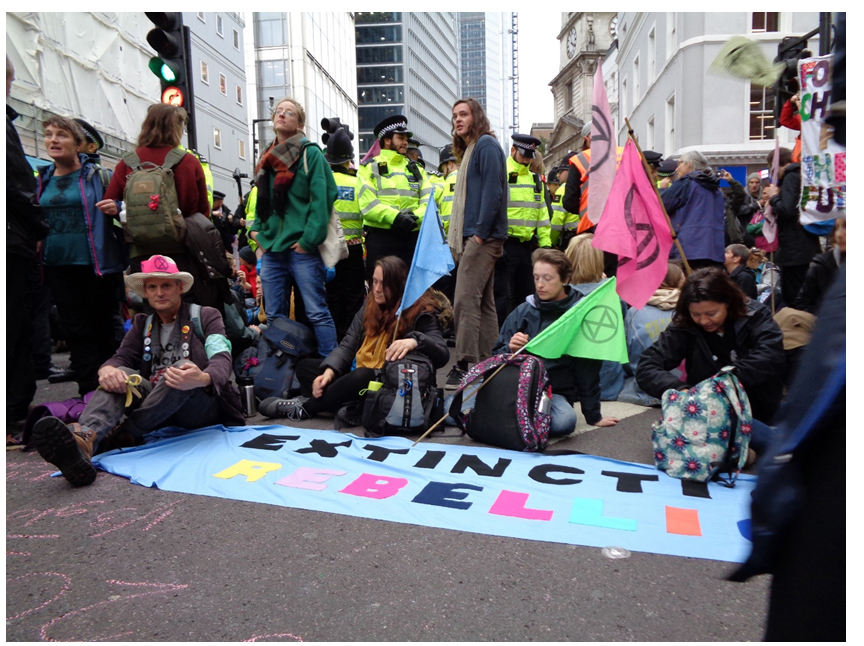
Rewinding to Waterloo bridge on the Thursday, walking from Euston to Waterloo East, with all our signs and badges – including my home-made and slightly absurd magenta hat band adorned with XR sand timer symbols – we inevitably attracted the police guarding the grand river crossing. But in friendly tones, they merely asked if we had enjoyed the day. Soon we were over the Thames, with its inspiring flood of silver light dividing the 360% panorama of iconic buildings. Parallel with the Hayward Gallery at the other end of the bridge, we stopped to clarify our direction with another assembly of sentries in fluorescent jackets – which caused a slight disagreement amongst them, until one produced his mobile phone to check. Although I’d already made a crude, biro-sketched map on a scrap of paper to correct my long dormant memories of Waterloo East, we thought the encounter beneficial to public relations.
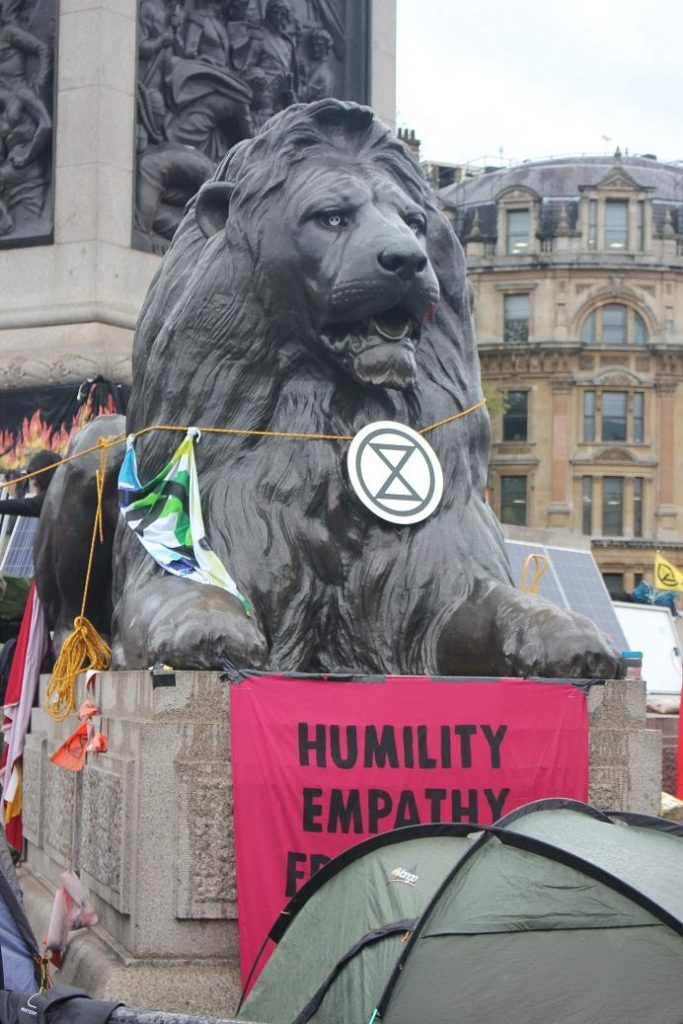
Early next day, meeting family en-route at Woolwich, we headed to Trafalgar Square. As soon as we emerged from Charing Cross, we could hear the samba band drawing people under the grey skies toward the bustle of the tented encampment overwhelming the base of Nelson’s Column. The four lions looked proud to play host and glared above us like the final arbiters of democracy and determination. In due course, the children enjoyed the activities in the Family Hub and for a while we listened to various speakers addressing the crowd from the makeshift tower of pallets and other peculiar pieces of wood, some of which looked like empty speaker cabinets, others like sections of furniture. Little were we to know that one of these precarious-looking constructions would the following morning become humorously known as The Tower of Power. One speaker (only subsequently identified as Gail Bradbrook, one of XR’s co-founders), facing down Whitehall, punctuated her reading with chaotic ad-libs, and gave no sign whatsoever of the supposed “messiah complex” touted in right-wing newspapers and media . . . which means just about all of them. But we didn’t stay too long, as she also swore a lot and we were worried about the effect upon our poor innocent children – though I’m sure they get far worse in the playground.
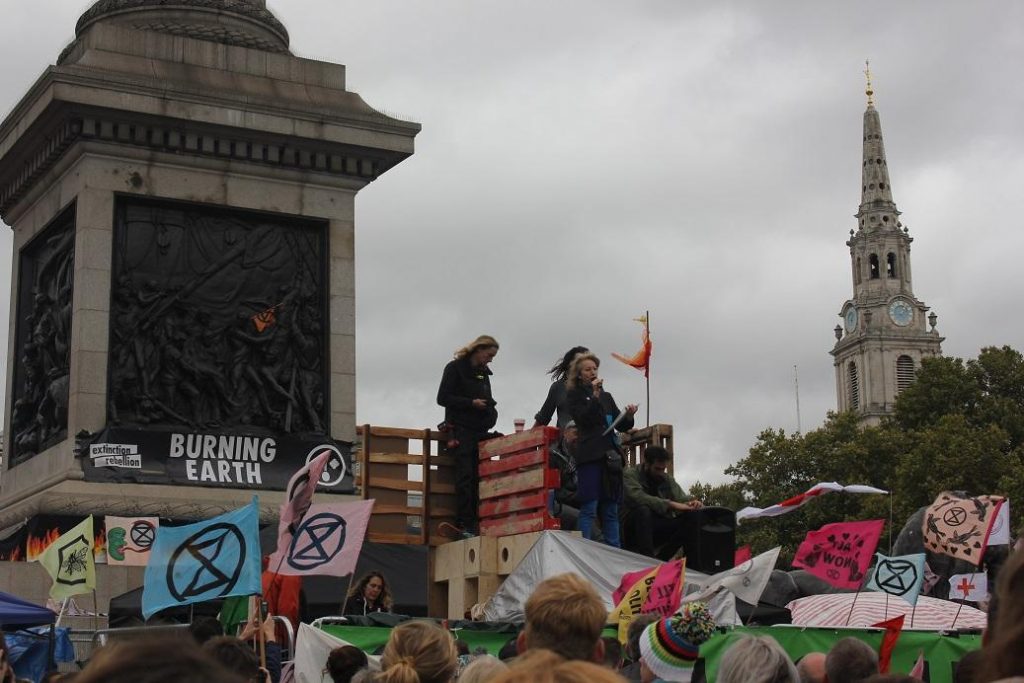
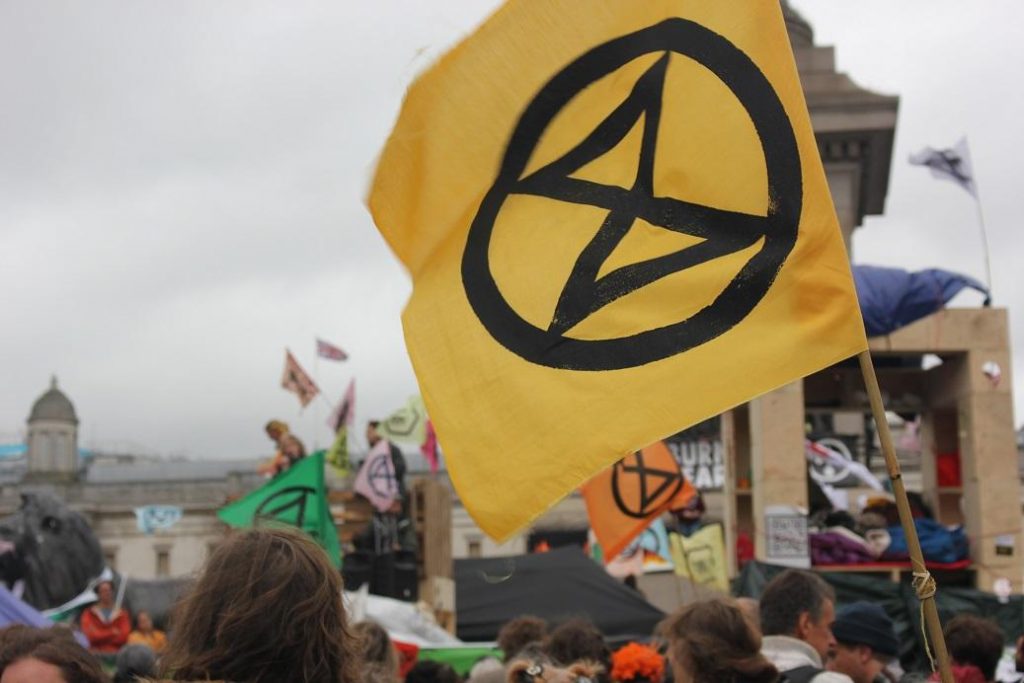
During our windswept picnic on soggy benches up beyond the fountains, I was lucky to meet Rowena from York, an XR member who like me could not locate their home group. As the rest of my family had plans more suitable for children, Rowena and I decided to join forces and were soon recruited by a woman with a clipboard. Would we be interested in joining the protest against the fiscal conference about to start at Liverpool Street? We headed east-north-east, wondering if we’d be two of fifteen demonstrators. Fortunately, by the time we arrived, there must have been well over 500 of us. Soon the roadblock was underway.
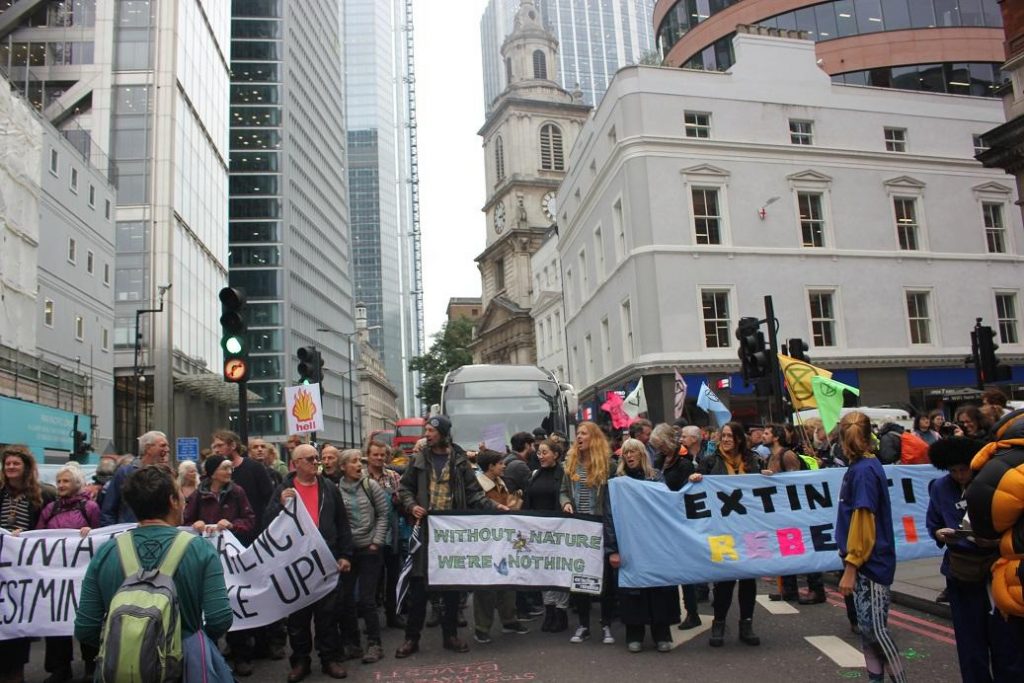
Supporting the group of ‘arrestables’ – some of whom had glued themselves to the road, others to the doors of the hotel – Rowena and I stayed until dark, blocking the road for 5 or 6 hours. In all that time, those of us short of food were well supplied. Sandwiches, fruit, bags of apple rings, all were offered around, the York group Rowena had chanced upon at the site, even supplying me with coffee.
A bold XR man climbed on a lorry trapped inside the blockade, claiming the roof with a flag. Later, some duct tape, passed on from a Cornish woman unwilling to abandon her banner, was used to attach WESTMINSTER WAKE UP to the lorry’s side. Inside the cab the lorry driver himself stayed philosophical, even after a younger member (unlikely sobriquet: Jelly Bean), also conquered the roof – and it took hours to remove them, special climbing police with ropes and hard hats being required.
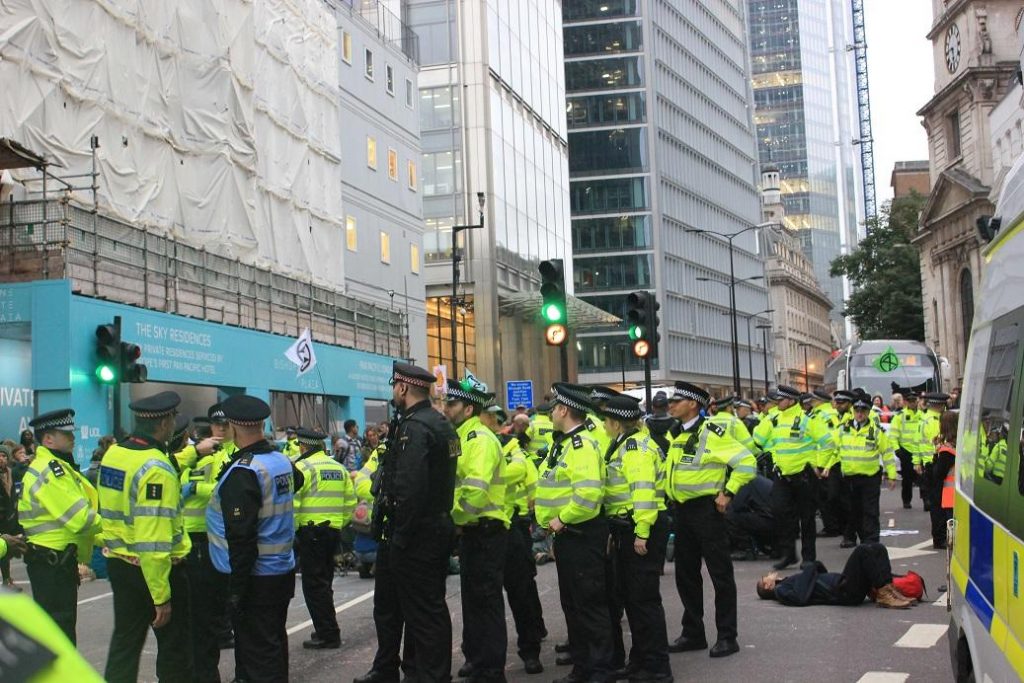
After a few hours, a huge influx of police began subtly to widen their barricade around the ‘arrestables’. Rowena and I, sitting on the road were threatened with arrest, and chose to retreat the “five yards back” requested by the officer in charge. “What’s that in metres?” A policewoman asked aloud, “I’m no good with yards.” “More or less the same,” I answered in cavalier fashion, indicating a point on the road where we both stopped. She smiled her thanks. The blue and white POLICE DO NOT CROSS tapes – which for some reason faced the police rather than us, as if warning them not to fraternize with the natives – were moved slightly to the front of a police van trapped inside the blockade and everyone went on chatting. Periodically, loud chanting broke out, flowing quickly through the crowd as the samba band erupted volcanically again.
Briefly, to allow an NHS blood-supply lorry to pass through, we lifted the roadblock, remaining alert to quick closure. The driver, window lowered, raised his fist: “Power to the People”, he shouted to a burst of applause, whistling, renewed chants, and a wave-crashing crescendo from the drummers.
Quite by chance, I caught sight of Gwen, a member of XR South Lakes and one of the ‘arrestables’, being escorted away. Only moments later, three of the young people who’d taken over on the banner to my left, introduced themselves and I shook hands with Eli. Amazingly, all of us it transpired, came from the Kendal area. Others I met were from Brighton, Liverpool, Truro, Birmingham, Langport, Christchurch and Sunderland.
In all the time at Bishopsgate, where quite a few demonstrators were arrested and carted off, I only encountered one slightly negative bit of policing and had some thoughtful conversations with officers on the other side of the barricades. Many implied without risking being obvious, that they felt their excessive presence was unnecessary. Such heavy deployment was causing a dire shortage in other, vulnerable and crime-ridden areas. At the time, unaware of the negative experiences of not least the disabled amongst us, who had special access toilets and battery packs for wheelchairs confiscated, it wasn’t hard to sympathise with some of the views of individual constables.
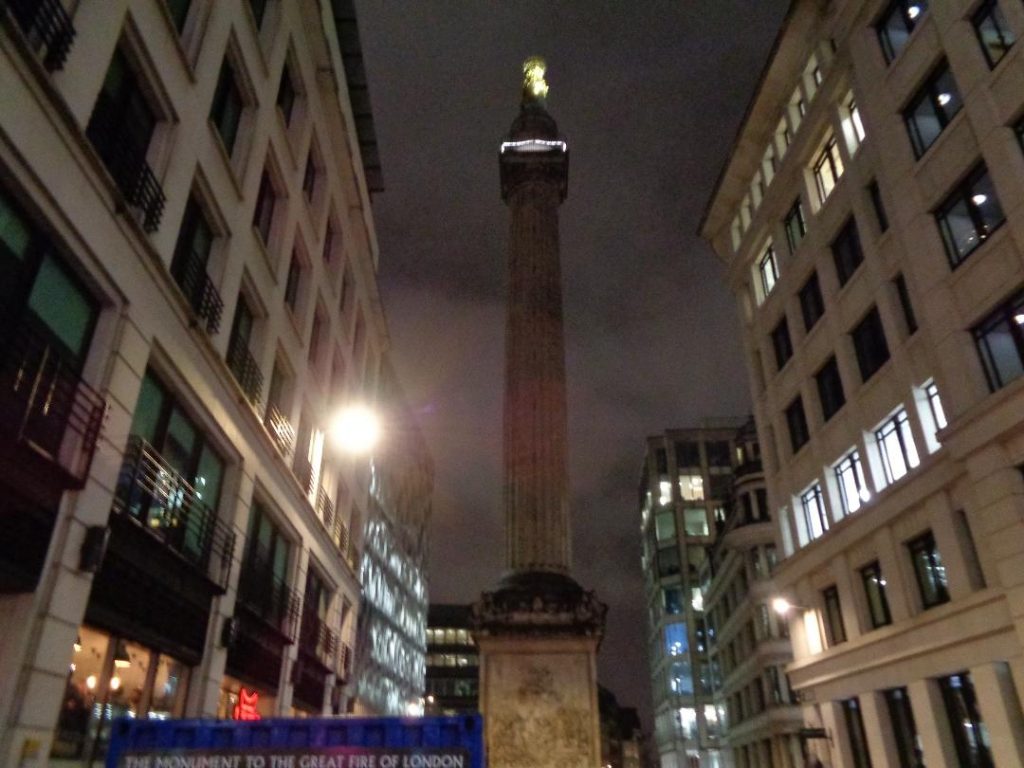
The night sky gave no warning of the sudden downpour that struck us all just after 7 o’clock. Events were winding down by then and at about 8 o’clock I left, walking south down Bishopsgate and Gracechurch to pass the Monument to the Great Fire of London off King William Street. Just before the road becomes London Bridge, St Magnus Martyr to the left – long since hemmed in by office blocks – naturally made me think of The Waste Land (1922)[iii] and I dreamed in my head, the inexplicable splendour of Ionian white and gold. Almost a hundred years old, Eliot’s renowned poem is remarkably apposite for the times we are living in: its stony rubbish and dead trees; its fear in a handful of dust or death by water; its violet hours and falling towers.
Across London Bridge and along the South Bank – I had some interesting quips and occasional sallies with members of the public, plus some distant abuse from others. With an inherited XR flag at this point, I could hardly go incognito. Around Southwark Cathedral and Borough Market, a zone I loved in the 1980s, frequently staying at a friend’s squat in Elephant and Castle, I was again, in the rainy night, entranced. Having returned to this area many times, I was well aware of its subsequent gentrification, always preferring it as it was 35 years ago: more real, its wartime atmosphere unspoilt – a borderline slum, but one concealing hidden jewels. Now, the rainy night concealed its falsification.
Near Tate Modern, a French student, dancing to a homeless accordion player, was keen to know the latest events. It was a day of respite for her – but “everything had been so good! When, other-times, does you get the chance to camp outside Westminster Abbey?” she smiled at me intensely, her eyes shining. Impulsively embracing me, she held my hand before we parted.
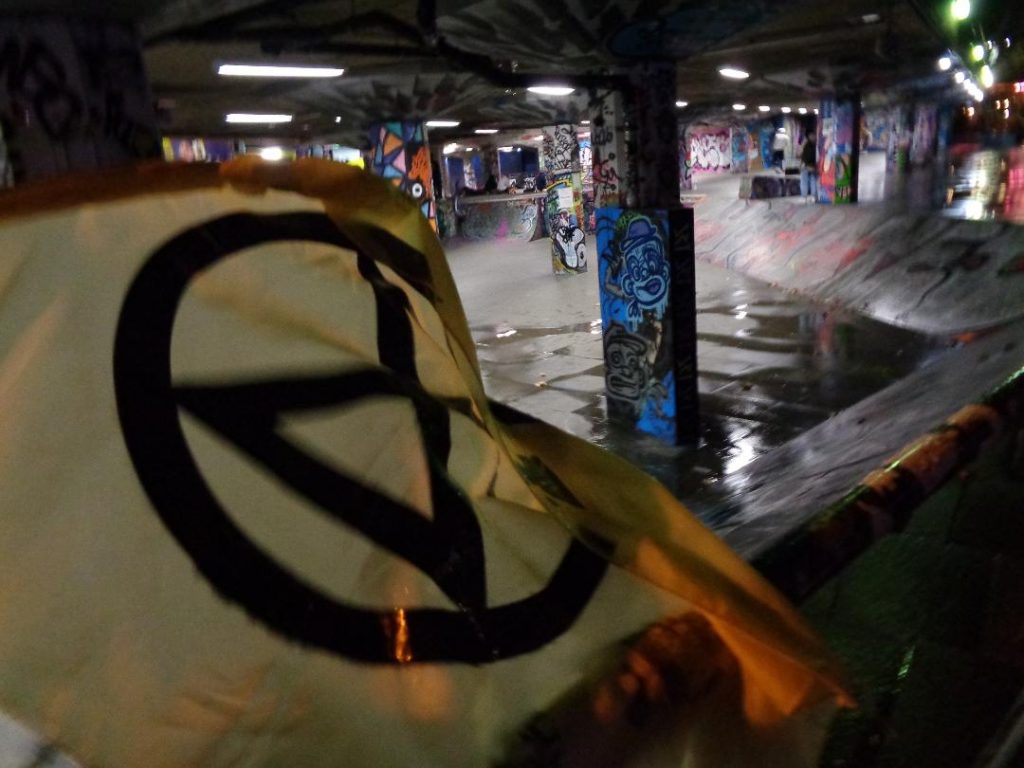
Along the river past the National Theatre, the wide-flagged path beneath the trees spun with lights, was inundated with large puddles, pedestrians walking in loops. Beyond Waterloo Bridge, and past the NFT[iv], The Southbank skatepark was busy, out of the rain. Hungerford Bridge reeled back the years, and for a while in front of County Hall[v] I thought that I might meet the Saint[vi] out for a night stroll with his halo gleaming . . . but his stylish suits were never fond of rain. Next, I remembered Saint Ken[vii] Livingstone and his hoisted banners against arch, neo-liberal dalek, Thatcher, destructively ensconced across the river, a Moriarty[viii] at the centre of her web.
What with the downpours, on these safe riverbank walks without traffic, I experimented, eyes shut, with sleeping whilst walking along. It wasn’t a great success.
Under Lambeth Bridge’s tunnelled footpath, stopping out of the rain to write down these notes, I ended up sharing the space with three policemen having a fag break from guarding the bridge above.
I don’t know whether Peninsula Heights, the tower-block at 93 Albert Embankment, Lambeth, has always been called that, but high in its square of rising windows seem to have worked or lived half the rich and successful film and TV characters of the later 60s and early 70s. What other block would give that superior penthouse view of Westminster from apparently mid-river? Back-projection of course, is the more likely explanation. One flat currently for sale within[ix] (at a mere £4,950,000) even uses the line: So close to the river, that from the upper floors it seems like the building is hovering over the Thames. When the river rises, I suppose if you have a boat moored alongside your high windows, you’ll be alright for a while?
Unlike the area to the east of Waterloo, I haven’t walked the Vauxhall environs for maybe thirty years and barely recognised it. In those days other than four and six-storey council blocks, there were few things higher than the wooden awnings of the station, up on the railway arches. Now, every other building scrapes the sky.
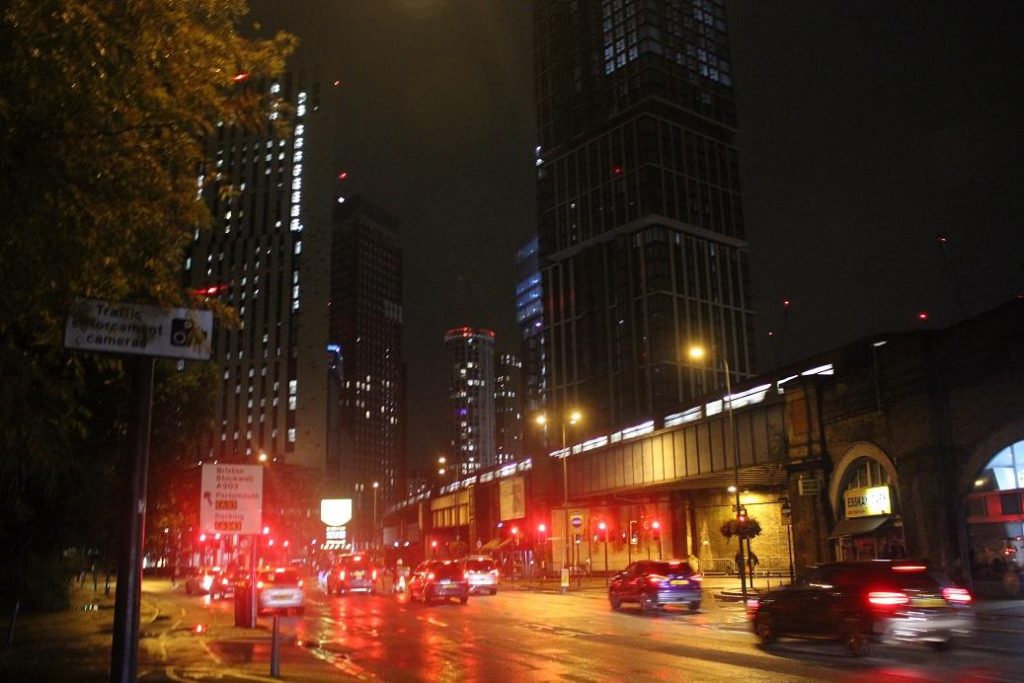
Although I left London before I was 4 years old, I remain absurdly proud of the common fact of being born there. Despite the surname, all my family were Londoners by birth or in one case, by adoption. London is still the place I feel I came from: a position that films of the past will always be able to reaffirm[x], however reckless the economic falsity of its endless building for those who don’t really need it, becomes.
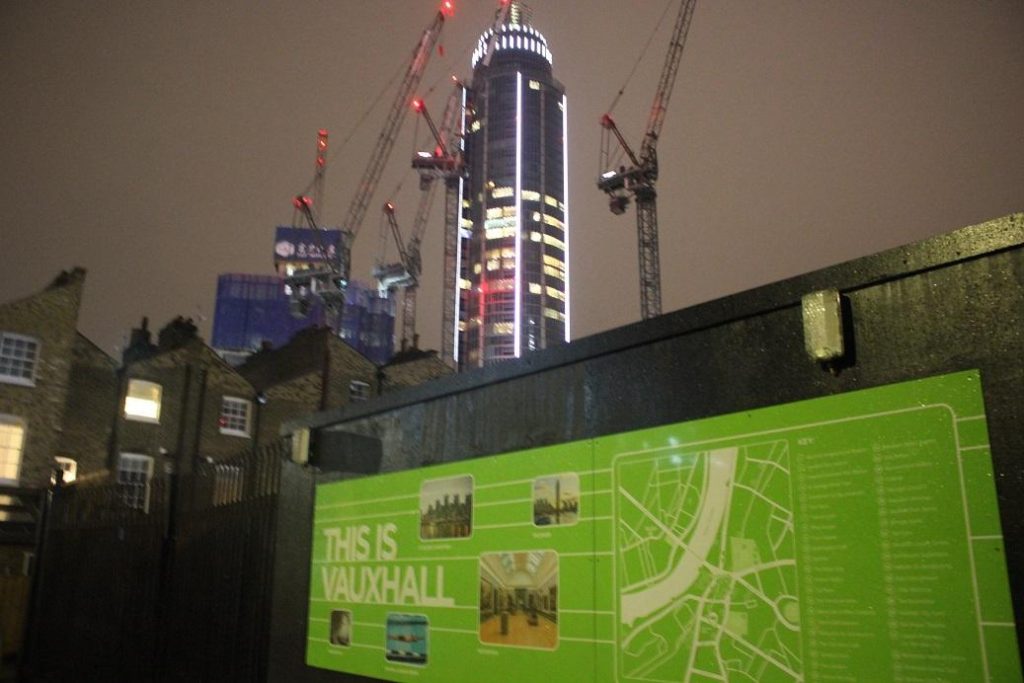
At about 10.30, I reached Vauxhall Gardens, but couldn’t see anyone I knew in the extensive tented encampment, nor find a source of superglue to repair the sole now coming away from my left boot. Since it was a silent camp with lots of friendly police doing the rounds, wishing us cheery goodnights, I departed – initially in the Battersea direction. On my way out, I was whisperingly invited between patrols, to join the Animal Rebellion’s raid on Billingsgate, and thought back to London Bridge and the pleasant whining of a mandolin on Lower Thames Street[xi]. But Billingsgate fish market now, is way out east, near Blackwall, at the top of the Isle of Dogs. I didn’t think I could usefully contribute and get back in time for my daughter’s night bus from Manchester.
Crossing the river, I tried to find a quiet bench. There was a good one opposite Battersea power station, but the traffic was still running heavily at 1.30. Finding a quieter spot under trees on a green space between tower block flats in Pimlico, it began to rain again. Having full waterproofs in my bag, I put the trousers back on and tried to doze sitting up, but got pestered by a drunk woman, who talked and ranted for an hour without listening, verging all the while from suspicious to aggressive. Daughter of an ex-“proper villain” she glowed proudly, one she still “loved to bits” – “But why did the fuck did they take me as a babe in arms” (brief rocking motion of her arms) “to Stone fucking Henge?” – she contradicted herself with every sentence.
Tania, she said was her name, and she was a big woman – solid rather than fat, with a black puffer jacket and incongruous glittery shoes that looked like slippers or flip-flops. “Do you like rain?” she kept asking, sneering at my poverty for not having a hotel to go to, while deriding my “posh” accent or “fake-sounding” laugh. She didn’t believe I grew up on a council estate or that I wasn’t a CID man working undercover – though in the end she must have doubted the latter!
“This is a bad place to be,” she warned as if that hadn’t crossed my mind. There were “murderers and drug dealers.”
“I’m not stopping you from going home,” I replied, getting irritated by this point.
“Why aren’t you scared to stay where you stick out like a sore fumb?” she demanded to know. Perhaps I was a “serial killer – gettin ready to chop someone up and wrap’em in plastic”?
Whatever kind of weirdo I was, “I must like rain” . . . which thought unsettled her, or perhaps made her gentle and interested again, as if she liked me after all, or was puzzled by something that fascinated her.
As usual, I expected too much: for somebody self-admittedly out of control to have some predominant, connected personality . . . Drunks, drug addicts and the insane are rarely more than superficially interesting; their incarnations in literature and films largely the product of poetic license; their pyrotechnics, stage-managed. In truth, unless you know them well, the humorous ones are as tedious after five minutes as the aggressive ones are immediately. “This is my manor.” She claimed more than once, dangerously. Immediately evoking the bullying thugs that are only amusing in films. Or the kids bigger than you from years ago – all that pointless jostling which stems from insecurity, ignorance and often, child-abuse.
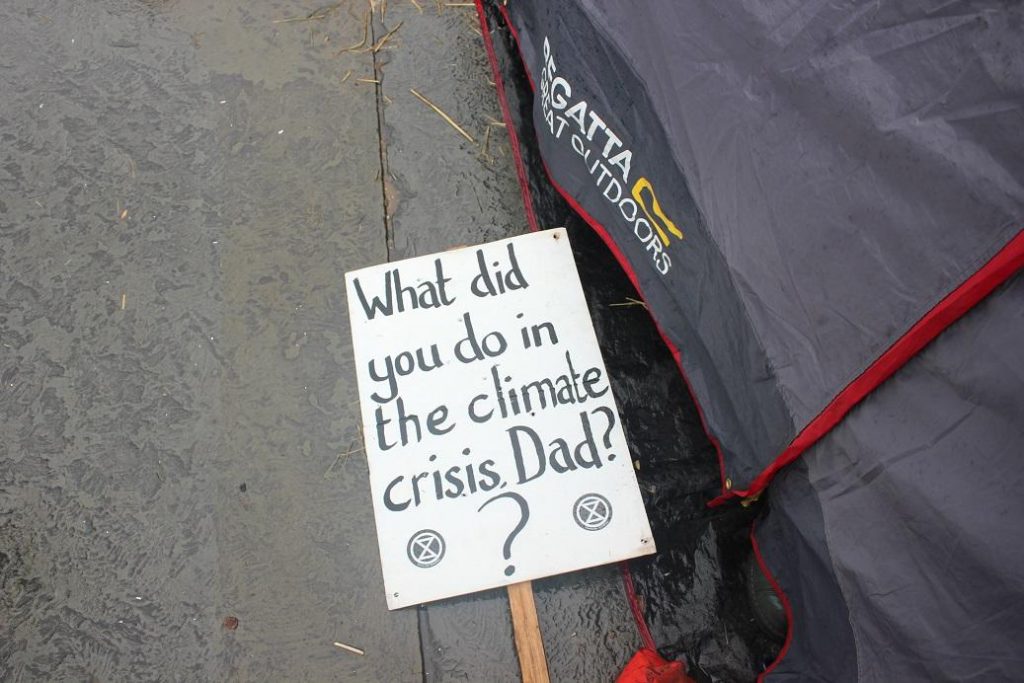
“D’you know what? D’you know what?” she’d snarl accusingly before each challenge.
She flicked her hands around constantly and too close to my face. Eventually, I realised I’d have to go or be forced into violence. I think it was my resistance towards violence that irritated her more than anything, and she demanded to know why I’d always “let all the women in your life dominate you?” a fact she claimed she could read in my eyes, as if what she most despised about me was that I didn’t tell her to “shut it” or “fuck off” or club her into submission as her dear old dad would have done. Climate change was all “Bollox!” What the government should really care about, was “all the paedophiles on the loose”. Who cares about climate change “when they could be up in space?” she added, looking around, momentarily blissful. Did such apparent mysticism stem merely from drugs?
“I may be forty-five and my brain’s fucked” (her mobile hands making pointing signs to each temple) “but I’ll still outlive you out of the grave!” she asserted, illustrating the strength of her hand grip, and showing me the tattoo up her arm: ONLY THE STRONG ONES WILL SURVIVE. “I’m my farver’s dorter”.
She had contempt for all activists, claiming she was a “revolutionist”. “Guy Fawkes had the right idea”. Naively interested again, I asked her what she did about it. But of doing anything, she was scornful, as if being a revolutionist could remain just a state of mind. It was her excuse both for approving of Brexit and for never voting. She was like some nightmarish, fascist, partial contradiction to Johnny (David Thewlis) in Mike Leigh’s unforgettable, Naked (1993)[xii]. She kept insisting that she was a strong woman who could “see through people”, though it was clear that (like her father?) all her strength arose from a lack, and her insight was no more than paranoia or fantasy.
Though I struggled at the time not to make any judgements; to be fair and friendly; to follow her chain of barbed-wire thoughts, this became impossible. A sympathetic comment made her suspicious and belligerent; a disagreement, scornful; while an indulgent neutrality was liberal, pathetic and weak. “I’m no conformist.” She re-iterated, as if to do anything in conjunction with anyone else, was to conform.
I finally got away from her when she snapped the stick of my inherited XR flag and tore off my XR hatband. I think she wanted me to beat her up, like her darling dad used to, but it’s hard to say.
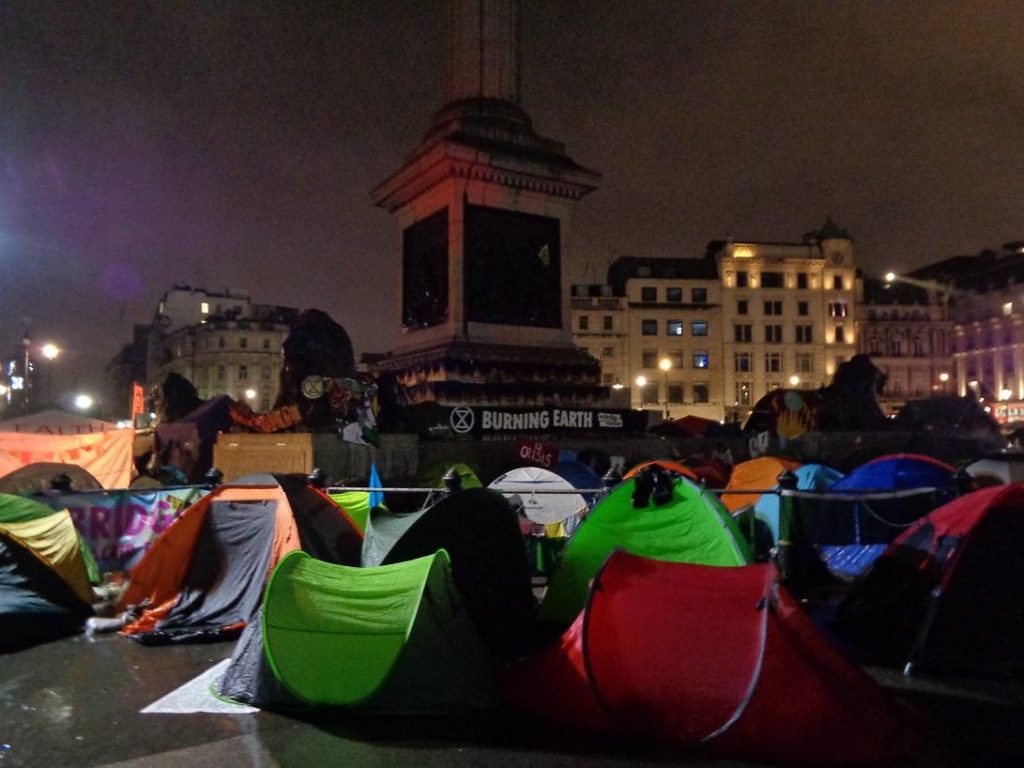
Trailing Lupus Street and Turpentine Lane, at Victoria coach park, I was still hours early for my daughter’s bus. Diverting via the abandoned Parliament square, to approach Trafalgar from Whitehall it was almost 3 a.m. and a huge phalanx of police were seemingly blocking access to the tented encampment. Nonchalantly side-slipping, as if making for the Strand, it was possible to approach from St. Martin’s in the Fields. In the rain-slicked night silence, the camp looked vulnerable. I tried to sleep on a bench for a while but discovered the waterproof’s waterproofness was limited and certainly less than 100%. . .
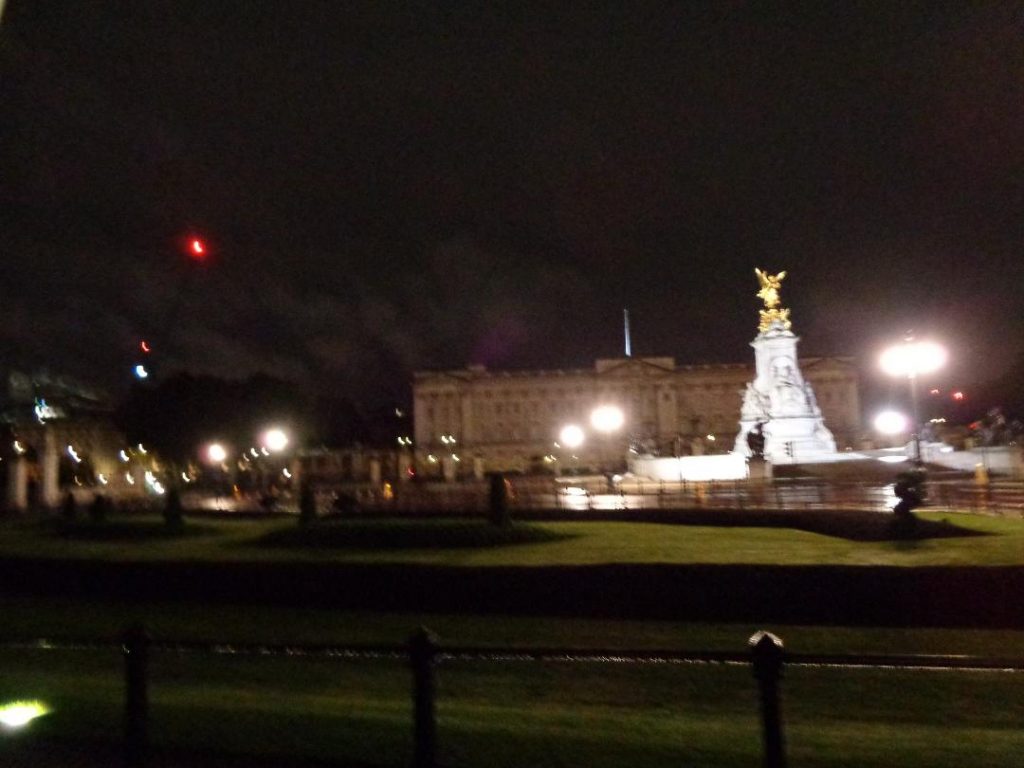
Setting off at half-four, the walk to Victoria coach park via the Mall and Buckingham Palace, was weirdly empty. No security, people or cars were visible . . .
My daughter’s bus was early and sitting in St.James Park waiting for the sun to rise or break through the cloud, we had an odd breakfast of leftovers – mainly ginger biscuits dipped in houmous. Predictably mobbed by coots who were soon dispersed by geese, we knew they would not be interested in our strange repast, and, in any case, would have kept it too ourselves, determined to like the combination. Half a bag of dead salad was more suitable, yet they all turned their beaks up at that and left us in peace. Unhappily, the sun we were hoping for never arrived, and in an increasing drizzle we moved on to keep warm.
Back at Trafalgar Square, we took the precaution of approaching from Pall Mall, but the police presence had diminished. Climbing onto the plinth at the base of Nelson’s Column, we met two students from Birmingham emerging from their tent. The damp downbeat atmosphere persisted, until the ‘arrestable’ occupiers of two wooden towers also emerged from under their sheets of plastic and began to shout back and forth to each other above the cordon of police. Much later, we all became engaged in a triangle of chants and communications, largely misheard but very funny nevertheless. Some musicians assembled outside the police barricades and began to sing, developing the People have the Power chant into a full-blown improvised song, during which the rickety wooden construction became the ‘Tower of Power’.
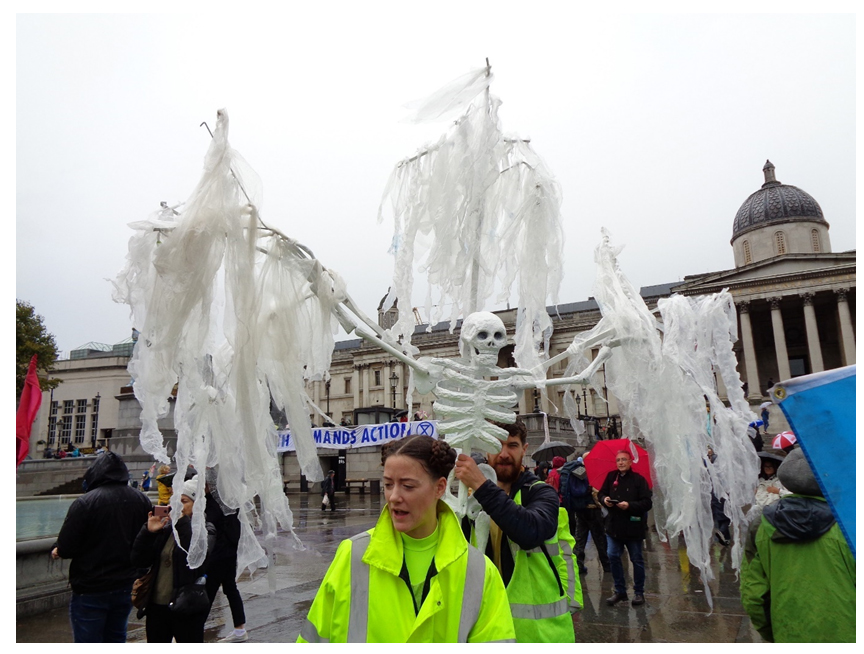
By 11 o’clock, refreshed demonstrators and other sightseers were pouring into the square. A new banner co-opted John Lennon as Extinction Rebel Lennon[xiii] – which had a grimly Orwellian ring, but never mind, we liked it. Other semi-compatible and sympathetic groups also arrived, including one[xiv] handing out leaflets ‘Challenging Johnson, Trump and the Racist Right’ and advertising an International Conference against Racism, Fascism, Islamophobia & Antisemitism for the following Saturday.
Growing impatient with the festival relaxedness, we cast about for some action. A band was forming to lead an impromptu strike towards Marble Arch, there to rendezvous with the Strength in Grief parade, due to march east along Oxford Street to Russell Square. Fired up by their thundering rehearsals, people gathered in readiness. Led by a man of infectious enthusiasm and flexibility, combined with abrupt arm movements and signals reminiscent of J.K. Simmons in the 2014 film Whiplash[xv], but totally opposite in his intentions, the beginning of the march was delayed by a drunk. Swaying and staggering to the rhythms, he slurred enthusiastically about how much he loved us, but carried on shouting when the music stopped. A volunteer, trying to explain that XR members didn’t drink while involved in actions, gently asked him to move back as he was drowning the decision-making process. Before long we were all “wankers” and climate change “crap” – which echoed Tania from the night before with her hand-megaphone raspberry. Certainly, the misguided actions of some XR members, actions which a large majority were against[xvi] – for example targeting the Underground[xvii]: transport which should be supported and could be run on renewable power – are a mistake. Actions, where the adrenalin gets the better of people or where the waste factor is too great. I understand the desperation, but as with the police and their ridiculous attempted ban, some things are only bound to backfire.
Reaching Marble Arch, we finally located the rest of our family amongst the estimated 30,000 people beginning to form the eastward funeral procession to Russell Square. Despite the drizzle this whole experience did feel historical – the main difference from all the major demos of the 70s and 80s, being that public support and interest appears magnified. Thousands of cameras were filming that memorial parade, which must have been a mile long or more – I don’t know, we were right up at the front behind the skeletons, the coffins and the giant skull[xviii], in a rainy, Day of the Dead, phantasmagoria.
With a brass band playing funereal music in-between the shouts and respectful silence for the extinctions imminent due to climate change . . . I accidentally ended up carrying one of the small coffins. Due to erratic pacing, the teenage girl shouldering the corner ahead, her gothic make-up dissolving in the rain, turned to me excitedly as we failed to slow sufficiently for the gates into Russell Square Park: “We’ve headbutted the skull!”
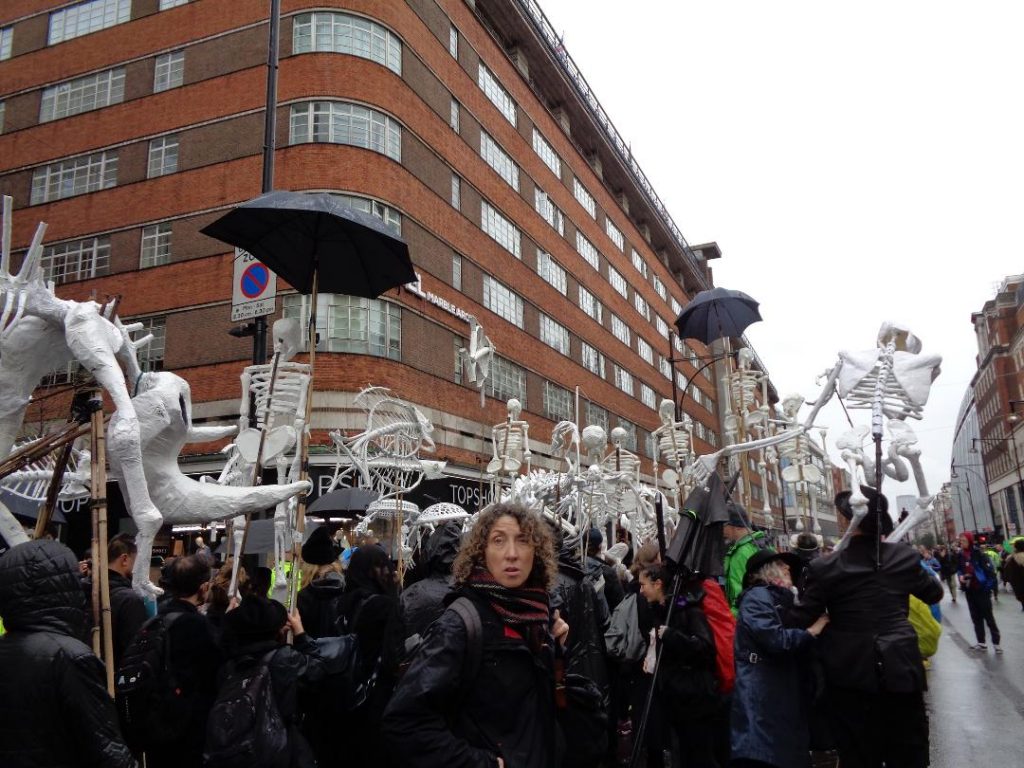
In conclusion, I have to admit to being unconvinced by the much bandied-about figure of 3.5%[xix]. When the aim is to replace a clearly corrupt or evil regime with one which – at least at first – is less corrupt, then perhaps, because the background populous is largely in favour, 3.5% of people on the streets can bring about change. What XR is proposing however, is the replacement of a corrupt, destructive and universal way of life and aspiration – one that is deeply engrained in almost all of us. The general population isn’t too frightened to rebel, rather, those that have even heard about it, are hoping that climate change is a statistical mistake and will just go away. Head in sand, it’s clinging, fingers-crossed, to that hope. What is needed, is the rapid adoption of a selfless and international austerity, but when is any political party going to risk suggesting such an idea? Meanwhile, no matter how supportive the population may become, many will trust that all they need do, is eat a little less meat, wear a jumper more often, and only fly abroad twice a year . . . That a universal austerity (and worse, if we don’t act fast), will be forced upon us anyway, doesn’t help. As for the insulated rich at the top, they probably feel they can escape or pay for private armies and protection.
Personally, I have an inbuilt and sadly cynical self-defence system: With regard to the environment especially, society has been going worse than nowhere for more than a century, so I’ll be very surprised – and happy – if this can be turned around.
Lawrence Freiesleben, London and Cumbria, October 2019
[i] To quote George Monbiot’s recent and concisely informative feature, written just before he was arrested, regarding Extinction Rebellion being too white and too middle-class: “Both charges are true, as the organisers recognise,” etc See: https://www.theguardian.com/commentisfree/2019/oct/16/i-aim-to-get-arrested-climate-protesters
[ii] https://10times.com/government-oil-gas-fiscal-summit-london SEE ALSO : https://www.theguardian.com/commentisfree/2019/oct/09/polluters-climate-crisis-fossil-fuel
[iii] https://www.poetryfoundation.org/poems/47311/the-waste-land
[iv] https://en.wikipedia.org/wiki/BFI_Southbank
[v] https://en.wikipedia.org/wiki/County_Hall,_London
[vi] https://en.wikipedia.org/wiki/The_Saint_(TV_series)
[vii] https://en.wikipedia.org/wiki/Ken_Livingstone
[viii] https://en.wikipedia.org/wiki/Professor_Moriarty
[ix] https://www.knightfrank.co.uk/properties/residential/for-sale/peninsula-heights-albert-embankment-london-se1/RVR160002
[x] Films such as, All the Right Noises (1971) https://www.imdb.com/title/tt0064004/, Lost (1956) https://www.imdb.com/title/tt0048315/?ref_=nm_flmg_act_13 or Herostratus (1967) https://www.imdb.com/title/tt0061761/?ref_=nv_sr_1?ref_=nv_sr_1
[xi] Or mandoline as Eliot writes it in The Waste Land.
[xii] https://www.imdb.com/title/tt0107653/
[xiii] See The London Rebellion in Pictures: http://internationaltimes.it/the-london-rebellion-in-pictures/
[xv] https://www.imdb.com/title/tt2582802/
[xvi] https://rebellion.earth/2019/10/17/statement-on-todays-tube-action/
[xvii] Four or five ‘members’ amongst 50,000
[xviii] Having failed to get a decent picture of the giant skull and being useless with computers, this ridiculously long link is the nearest I could get to illustrate it:
https://www.google.com/search?biw=1440&bih=740&tbm=isch&sa=1&ei=_2ysXbT0BcGH1fAP8si9oAs&q=Extinction+rebellion+the+giant+skull+&oq=Extinction+rebellion+the+giant+skull+&gs_l=img.3…56057.65977..66246…0.0..0.114.1985.18j4……0….1..gws-wiz-img.vLPeKTqw3Bc&ved=0ahUKEwj0752RhKvlAhXBQxUIHXJkD7QQ4dUDCAc&uact=5#imgrc=5AuhyybTA7ZhpM:
[xix] https://www.bbc.com/future/article/20190513-it-only-takes-35-of-people-to-change-the-world

Now we have Extinction Rebellion attacking the indigenous peoples with their imperialist attitude.I find that disgusting.The coup d’etat removed Evo Morales yesterday.
On 26 August, Novara Media’s website published a vicious and reactionary article titled ‘It’s Not Just Brazil’s Forests That Are Burning, Bolivia Is on Fire Too’ by prominent Extinction Rebellion speaker and activist Claire Wordley. Novara and Wordley are recycling from the same imperialist playbook which has been drawn on in recent attacks against Venezuela, Cuba and Nicaragua – the so-called Troika of Tyranny. The gist of Wordley’s article is that Bolivian President Evo Morales is to blame for the fires raging in the Amazon rainforest; that he is as ‘damaging as … the capitalists Morales claims to hate’; that he hasn’t responded to the fires effectively; and that when he has responded – such as by hiring a Boeing 747 Supertanker to douse the flames – he was forced to do so by ‘volunteer citizens’.
https://off-guardian.org/2019/09/09/propaganda-blitz-against-bolivias-progressive-government/
Comment by Dave Lawton on 12 November, 2019 at 12:14 amDefinitely sounds a complex case worth investigation Dave – However, even if it turns that Claire Wordley was (inadvertently I presume) producing “regime change propaganda in the imperialist nations for free; those sources she cites and promotes”, “being handsomely rewarded by Washington”, to quote one sentence in the link you give, I don’t think that should deflect the general sense of purpose of the ‘ordinary’ Extinction Rebellion member.
Comment by Lawrence Freiesleben on 12 November, 2019 at 10:47 amIt would be a tragedy if Wordley’s work helped to remove a president, Evo Morales, who as far as I can judge from things I’ve read, sounded like a president definitely worth having. It certainly underlines the degree to which prominent speakers need to be very careful with both their research and their words.
What with all the layers of misinformation and manipulation which constantly bombard us from traditional, supposedly trustworthy sources, escalated by social media etc., I only trust what I have seen personally. Even within our local XR group, impressions of London were wildly different. The tube action for example put a lot of people off.
Regarding climate change however, the fact remains that if we vacillate, it will be too late. Internal bickering and the general apathy towards corruption, are what led to the possibly terminal disasters of Trump and Johnson. What we desperately need instead, in the forthcoming U.K. election for one, are alliances of shared purpose. Unfortunately, I doubt we will get them.
Lawrence our sources have been looking at XR for awhile and the connections of the founders.Here is a a snippet.Extinction Rebellion does imperialism’s bidding
Amid the drama unfolding in relation to Bolsonaro and the Brazilian rainforest, Extinction Rebellion (XR) found a new target for condemnation in the form of progressive Bolivian president Evo Morales, and were quick to place the blame for fires in Bolivia at his doorstep.
On 26 August, an article was published on the self-styled ‘radical left-wing’ Novara Media’s website titled ‘It’s not just Brazil’s forests that are burning, Bolivia is on fire too’, authored by a prominent member of Extinction Rebellion, Claire Wordley.
XR even went so far as to organise protests outside Bolivia’s embassies across Europe.
Through these acts, XR found itself ahead of the curve, with the Guardian and the Independent rushing to catch up and throw their weight behind the ‘Morales = evil dictator’ plotline. What should be interesting to readers about Wordley’s article is that it is almost entirely dependent upon claims made by Bolivian ‘activist’ Jhanisse Vaca Daza, who can only be described as a professional regime-change operative. “The latest.”I dream of a Bolivia free of satanic indigenous rites, the city is not for the Indians who should stay in the highlands or the Chaco”. – Self proclaimed president of Bolivia: –
“The Bible returns to the Palace,” says the new self-declared president of Bolivia, Jeanine Áñez, in a shot against indigenous communities.”
Comment by Dave Lawton on 14 November, 2019 at 2:18 amDave, thanks for your persistence over the tragic Bolivian situation – I take your observations very seriously and will be forwarding all your comments (along with the original article) on to XR admin today, in the hope that they will take note, comment, and even offer some kind of refutation.
Comment by Lawrence Freiesleben on 14 November, 2019 at 8:54 am“The Bible returns to the Palace” quote with which you end, is particularly chilling.